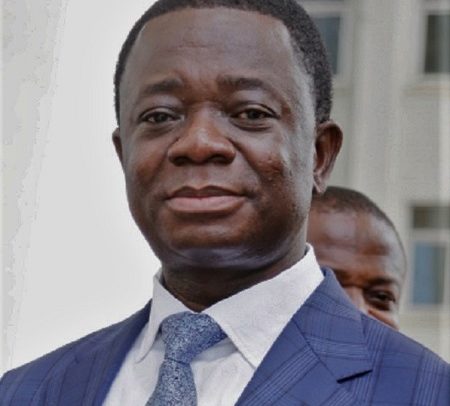Dr. Stephen Opuni
An Accra High Court yesterday adjourned the trial of Former Chief Executive Officer of Ghana Cocoa Board (COCOBOD), Dr. Stephen Opuni, and private businessman Seidu Agongo to January 31, 2022.
The adjournment is to enable the trial High Court to wait for the decision of the Supreme Court on a motion filed by Dr. Opuni seeking an order for certiorari and prohibition against Justice Clemence Honyenuga, a Supreme Court judge sitting as an additional High Court judge, from continuing to hear his case.
The embattled former COCOBOD boss filed the motion just few weeks after the High Court dismissed his application urging the trial judge to recuse himself from the trial on grounds of alleged hostility and likelihood of bias.
Justice Honyenuga yesterday indicated that it would be appropriate for the court to await the decision of the Supreme Court on the motion for certiorari and prohibition and therefore, adjourned the matter to January 31, 2022.
He added that all processes filed before the court would have to be on hold to await the decision of the Apex Court.
Recusal Move
The former COCOBOD boss, who is standing trial together with private businessman, Seidu Agongo alongside the businessman’s company Agricult Ghana Limited, for allegedly causing over GH¢217 million financial loss to the state, filed an application urging the judge to recuse himself from the trial on grounds of ‘hostility’ and ‘likelihood of bias’ towards him.
Dr. Opuni’s application alleged ‘open hostility’ towards him by the trial judge claiming “his acts and conducts are such that justice cannot be said to be seen to be done.”
Dr. Opuni through his counsel Samuel Codjoe argued that the court has gone back on its previous practice of agreeing on dates with lawyers involved in the matter and now imposing hearing dates contrary to what pertained when the prosecution was calling its witnesses.
The application had been opposed by Evelyn Keelson, a Chief State Attorney, who argued that there is no basis at all for the application and Dr. Opuni “failed woefully to demonstrate any credible evidence of bias against him by this court.”
“As we have stated in our affidavit, this application has been filed to start another round of antics by the applicant to delay the trial and that is why we took the trouble to present before this court in our affidavit in opposition the events that have characterised this trial,” she said.
She also contended that Dr. Opuni did not provide any evidence let alone a credible evidence to support his application, adding “the averments in his affidavit in support are mere allegations with no basis at all.”
Justice Honyenuga in his ruling had dismissed the application for being “malicious, mischievous, frivolous and vexatious and an abuse of the court process and well calculated to further delay the expedited, efficient and fair hearing of this case. The principle of justice delayed is justice denied applies in the instant case.”
Dr. Opuni, who appears not satisfied with the decision of the court, then filed a motion at the Supreme Court seeking to prohibit Justice Honyenuga from continuing to hear the case.
Main Trial
Dr. Opuni, Seidu Agongo and Agricult Ghana Limited, are before an Accra High Court slapped with 27 charges including causing financial loss to the state, defrauding by false pretences, conspiracy to commit crime, abetment of crime, money laundering, corruption by public officer and contravention of the Public Procurement Authority (PPA) Act.
Together, they are accused of causing a financial loss of over GH¢217 million to the state through the sale and purchase of the controversial Lithovit liquid fertiliser for cocoa, which the prosecution has insisted did not follow the testing standards.
Previous Attempts
It would not be the first time Dr. Opuni is making a move to get Justice Honyenuga off the case as he had earlier filed an application before the same trial court, to get the judge to recuse himself.
The application was then dismissed by the court, which held that it was brought in bad faith.
He also petitioned the Chief Justice to get the trial judge to recuse himself from the case, but the petition was dismissed by the Chief Justice, who stated that the petition did not disclose any likelihood of bias on the part of the trial judge.
SC Move
Dr. Opuni then went to the Supreme Court, asking the highest court to exercise its supervisory power to quash the part of the decision of Justice Honyenuga to exclude some exhibits in his ruling on a submission of no case filed by the accused persons.
He also asked the court to prohibit the trial judge from further hearing the case which was granted by a 3:2 majority of the court.
But the decision was later reversed by a 4:3 major review panel which reinstated Justice Honyenuga to continue hearing the case.
BY Gibril Abdul Razak


